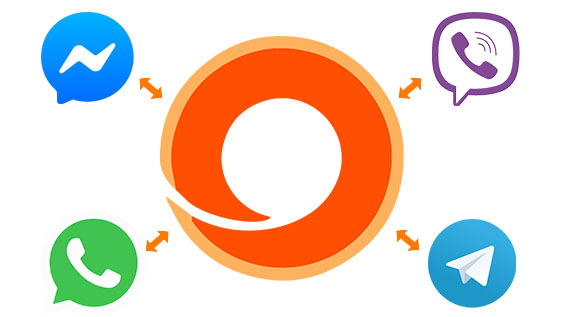

How Does SMS API Integration Apply to My Mobile Strategy?
While the digital age aims to make our lives easier, smoother, and more sensible, it has created some of its own challenges. Many companies are using a variety of systems and tools for internal workflow and for communicating amongst departments and with customers.
Add to that the increasing demand from customers to scrap the 1-800 numbers and long hold times in favor of digital options and there tends to be a lot of moving parts involved in keeping things running. SMS API integration brings modern communication to your customers and streamlined workflows to your business.
What is an SMS API?
An application programming interface (API) is a set of routines, protocols, and tools for building software applications. Simply put, an API is a set of requirements that govern how one software application can talk to another – allowing information to go back and forth between the systems. McKinsey says APIs “play a crucial role in linking organizations and technologies in ecosystems,” giving them a “significant competitive battleground capability.”
How does it work? For example, Yelp includes a Google Map in its app to display nearby restaurants. Several websites allow you to log in using your Facebook or Google account. Using an API makes it possible for applications, such as your CRM system, to share data and take actions in your SMS Gateway without requiring developers to share all of the software’s code.
Related: Salesforce SMS Text Messaging Integration
The API takes this code-sharing concept and simply limits the outside program access to a specific set of features – usually, it is requested for some specific data. Your API clearly defines how a program will interact with the rest of the software world. It saves time, resources, money, and potential legal issues.
How Does SMS API Integration Apply to My Mobile Marketing Strategy?
Who cares about SMS API integrations? You should… because APIs are a simple and cost-effective way to make mobile marketing easier for you. Let’s look at a few ways that you can leverage SMS API integration to make your mobile marketing strategy more robust.
Centralize Your Information
Some companies use an SMS API to integrate their marketing, analytics, CRM, and other business software with their SMS platform for creating more powerful and customized solutions. When marketers leverage SMS API integration with CRM software such as Zoho they are able to create a unified database.
Easily Launch Text Campaigns
Marketing departments can send SMS campaigns out to contacts from right within their CRM or choose to create messages from their SMS platform. Either way, the information will sync with the contacts in the CRM, making this communication transparent and available to internal departments.
Automate Messages and Alerts
Other companies use SMS API integration to automate recurring activities and procedures. For example, a text message alert can be triggered (and sent to the contact) by entering new information into your contact management system.
Consider an apartment complex: A package delivery arrives at the leasing office or door person. The recipient can enter into the CRM that a package has arrived for a tenant. This will trigger an automated message to be sent to the phone number associated with the tenant to let them know they have a package.
Automated alerts can also be sent in response to a subscriber action, such as submitting a registration form for an event or completing an online purchase. These alerts can confirm receipt or prompt follow-up action from the subscriber.
A Shortlist of Additional Benefits
After implementing SMS API integration, there are a variety of messages you may like to send. Consider using SMS for uses such as:
- Two-way communication with your customers
- Sending one-time passwords (OTPs) for system logins
- Two-factor authentication (2FA) for secure login
- Promoting product launches, sales, and promotions
- Announcing events relevant to market segments
- Updates for shipment tracking
- Personalized and customized bulk SMS
- Scheduling messages including time-sensitive alerts
Benefits of SMS API Integration
By now, you’ve likely caught on that your business can benefit from the various uses of SMS API integration. These benefits may be apparent to a single department or affect a broader business workflow.
System Integration
By implementing SMS API integration across systems, information is available in multiple places. Your various applications and platforms will have a view on the same content and messages, reducing latency in information sharing and the risk of human error.
Tracking
Your SMS platform’s API will create an audit trail for your messages. You will be able to track the delivery and receipt of messages, showing you the exact time a message was received by your customer’s device.
Clarity and Reporting
With the ability to track messages in a centralized way, you’ll be more able to pull the reports you need, when you need them. If you’ve bridged the gap between disparate systems, you’ll be able to pull ad hoc reports with greater clarity on the “bigger picture” of communications and interactions with your customers.
Related: How Text Messaging Platforms for Business Help CPG Companies
Efficiency in Teams, Departments, and Workflows
As mentioned above, SMS API integration makes information available across systems, teams, and departments. This means that the most current and complete snapshot of interaction with your customer is available to everyone. Employees will not need to track down team members or departments in search of information or wait for updates from others, making workflows more efficient.
SMS APIs will also allow you to automate processes. By applying automation to sending and receiving messages your workflow becomes more productive while saving the manual intervention of employees.
If you have a requirement to regularly send the same message, automation via SMS API can take care of the task for you. If your messages are time-sensitive such as an appointment reminder or status update, they can be scheduled for a specific day or time.
Creativity
One thing most of these benefits have in common is making things easier and more efficient in one way or another. By streamlining workflows and processes an inherent side effect is that your employees won’t be bogged down in the details. This creates more space for creativity and finding new ways to leverage SMS in your marketing strategy and outreach.
SMS for Business Workflows
SMS is the best way to reach your customers in a timely and reliable manner. Not only that, it’s how they prefer to be reached. Luckily for businesses, you don’t need to reinvent the wheel in order to communicate with customers via SMS.
SMS API integration takes things one step further, making life easier for both your customers and your teams. TrueDialog’s robust SMS platform enables you to craft, schedule, track, and automate messages to your customers and subscribers. Our SMS API is enterprise-grade and includes more pre-built features than any other platform.
Disclaimer: Please note that this advice is for informational purposes only and is neither intended as nor should be substituted for consultation with appropriate legal counsel and/or your organization’s regulatory compliance team.
API, Best Practices, Marketing Integration, MMS, Mobile Campaigns, mobile CRM, Mobile Marketing, operations
 Salesforce
Salesforce





